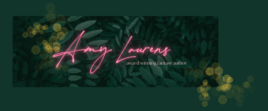Welcome to Throwback Thursday, where I pull one of my books/stories out of the archives and reintroduce it to you! This is fun because it means I get to revisit my past work and remember a) why I liked it and b) that I’ve actually written Quite A Few Books Now Thank You Very Much, which is useful to combat the ol’ Urge To Be Productive that says I haven’t gotten Enough done (with today, this week, my life… 😛 ha), and also because you get to hear about books you might have forgotten or not known I’d written, and random behind-the-scene tidbits about them! Hurrah! Winning all round 🙂
So, without further ado, today I’m going to talk to you about my first poetry collection, For A Little While, because I went trawling through it again last week looking for poems for a teacher friend. Wrawr.

So back in 2012, I had my first Small Person, and alack, I was struck with the hormonal sads, and the combination of that with postnatal exhaustion meant that I had approximately zero brain available to write creatively. Looking back now, I actually wonder if it wasn’t either of these things per se, because I’ve written since while Very Tired, and also while Very Sad – but now that I have a second collection of poetry under my belt, what I can see that they have in common is that at both times, I was undergoing Life Upheaval and my identity was shifting. My brain was literally rewiring in some important ways, and apparently for me that contraindicates fiction.
By the time Small Person The First was nearly a year old, I was writing non-fiction (preparing to dive deep into the throes of what was then called From The Ground Up, which has been subsequently broken up into How To Map, How To Create Cultures and How To Create Life), but the only writing I could do in that first year, the words that kept me sane? It was all blogging and poetry.
For whatever strange reason, it seems that my brain likes to process Major Life Changes through poems. Is this because I spent most of high school writing adolescent poetry? (I only wrote a couple of stories in high school – the vast, vast majority of my writing was poetry.) Or did I spend high school writing poetry because my brain was also undergoing rewiring, not just from the whole Being A Teenager thing but also because there was some pretty significant family trauma going on at the time? Who knows which way the causal arrow flies!
What I do know is this: I am one of those weird people who love poetry. I love to write it (though it’s a trick I absolutely cannot perform on command; it’s far too instinctive and mysterious for me, something vaguely magical, whereas my fiction is much more of a honed and polished skill that I can call on on command), and I love to read it.
If you DON’T love to read it, rest assured, you are in very good company with most of the rest of the world :’D But allow me to offer you a small insight, something I used to do with classes when we started the inevitable poetry units in class, where I announced up front to them that my goal was not to make them LOVE poetry (heaven forfend), but rather to make them hate it just a little less 😉
The insight is twofold, and it’s this: Poetry isn’t MEAN to be understood on the first go around. A good poem is a little puzzle box, and you have to read and reread it until you find the key (which, in a good poem, shouldn’t actually take you too long, though sometimes the key is literally “has a good background in the Classics”), and then the meaning becomes fairly apparent. (Unlike songs, which DRIVE ME NUTS because so often they are just an in-house conversation between the songwriter and ???? because THERE IS NO PUBLIC KEY #headdesk.)
The second part is this: to find the key, you can literally look at a poem like you do a picture. What shapes can you see? What repeated images, or repeated sounds that might be either soft and welcoming or harsh or blunt or….? Where can you see dark and light? Draw the opening of the poem. Draw the ending. Draw the middle. Scribble on it, essentially, until you find the key and it makes sense.
And then, of course, there’s the fact that I try to write my poetry to be accessible, and sometimes you don’t really need a key at all 😉
Ducks in Stormy Weather
Ducks, like beached boats
in rows on the river banks
lie beneath the howling wind
like hulls disused in winter’s grip
feathers ruffled by the tempest,
like peeling paint attacked by elements
Wind, which sometimes skims
ducks under swollen clouds
or lets them cut across the breasts
of waves, wings full of air, as sails,
now forces ducks aground
to wait for kinder weather.
